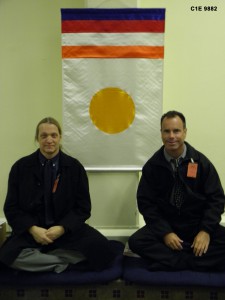Friday
Community ArticlesWar Behind Bars
Resentment is like drinking poison and then hoping it will kill your enemies.
~ Nelson Mandela
“It’s not the walls surrounding them that bothers the prisoners the most,” said the correctional officer. “It’s the people.”
Snake River Correctional Institution is the largest prison in Oregon with over 3,000 inmates. I was not there to lose my freedom, but part of a meditation workshop for military veterans sponsored by the Oregon Department of Corrections, the Snake River Shambhala Group, and Ratna Peace Initiative, a non-profit organization based in Boulder, Colorado.
The in-depth meditation instruction was led by Ratna’s education director, Gary Allen. My role as a veteran was to explain how I discovered the Shambhala Buddhist teachings in Iraq and how they led to the writing my book, Walking the Tiger’s Path: A Soldier’s Spiritual Journey in Iraq. We were accompanied by the prison’s Buddhist chaplain who tended to a group of over fifty regular practitioners whom we spoke with the first evening. The heart of the program revolved around the non-Buddhist veterans the following day.
As the prison guard had pointedly stated upon our arrival, it was not so much the walls of the prison that frustrated the men inside, it was the people around them; it was a matter of human interaction that would prove to be the greatest adversary, or sometimes, enemy. Their lives in prison may not have been as terror filed and dramatic as Dantes’s Inferno, but closer to Jean-Paul Sartre, who wrote, “Hell is other people.” Prisoners have no personal space – they’re completely interconnected and have to adapt to their situation or go mad, intensifying their habitual patterns involving ego and aggressiveness. There was no place to run. Chogyam Trungpa Rinpoche once said, “Things get very clear when you’re cornered.”
Some were Vietnam veterans, others veterans of Iraq and Afghanistan, far younger than myself. The environment was claustrophobic and intense; anger and aggression seemed to pour from the walls. I explained my sympathy for the Iraqis and the predicament that our invasion created. I told a story about how my father was patriotic and proud when I left for Iraq, but when I returned a different man due to my war experiences – many of them shocking and offensive – he expressed no sympathy or support; he just wanted me to go back to a “normal” life that no longer existed. I referenced an article titled, “Moral Injury in Veterans of War” from the National Center for PTSD that illuminates the complex nature of war trauma: “Moral injury has been defined as ‘perpetrating, failing to prevent, bearing witness to, or learning about acts that transgress deeply held moral beliefs and expectations.’” Most of the men in the room understood that war is an ugly business. But no training can prepare a soldier for experiences that threaten deeply held convictions.
Whether it had been forty years or only five, the most intimate and heartfelt expressions of pain soon began to manifest. One man told me a story that captured the sorrow of the innocent trapped during a time of war; usually the children. His duties during Vietnam were to clear the roads of mines. They would routinely drive into a village near their base passing a large trash dump consisting of discarded American items. From the truck he would watch young Vietnamese children scrounge through the debris looking for anything salvageable; he witnessed them being killed or maimed by explosives planted by both the Americans and the Vietcong. During these routine trips he would encounter the same children and pass out candy. The children greeted him with smiles on every visit. During one trip he approached the trash dump. Children ran toward his truck, flagging him down.
“Many V.C.!” they yelled at him, pointing to the nearby trash dump. Heeding their warning, he radioed his command and alerted them to the situation. A patrol was dispatched and when they entered the trash dump they were ambushed by the Vietcong.
“Those kids saved my life that day,” he said. “Even with all the f***ed up s**t that happened, I owe them that.”
Another Vietnam veteran told us how one day he was manning a guard tower around an American base. The road nearby was extremely dangerous, with the Vietcong planting mines. Through his night vision he could see two men planting mines and then concealing themselves near the road for an ambush. The sun soon began to rise and he saw an American foot patrol move down the road. With trepidation, he aimed the barrel of his 50 caliber machine gun at the two enemy fighters. He remembers nothing but pressing the trigger and unleashing a barrage of rounds.
An hour later the American patrol entered the base. With them were two Vietcong fighters. One was missing his entire right arm, cleanly separated from the shoulder as if a scalpel had swiftly made an incision. His companion, still alive, was missing a hand and his entire left leg, both removed so cleanly it was unreal. Firing at “the enemy,” from a distance, whether in Vietnam or Iraq was one thing, but when you see and feel the repercussions of your own anger and fear, the severed limbs or genitalia, it lives with you forever.
One young man, close to tears, opened himself up completely. He witnessed his own brother blown up by an IED in Iraq. Shortly after his return home he engaged in an altercation with his roommate where harsh words were exchanged. The man said, “Your brother got what he deserved.” In a state of extreme rage and anger he assaulted the man, nearly to the point of death. “This was probably the best thing that could have happened to me,” he said. “If I was still out there god knows what else I might have done.”
Milarepa, the famous Tibetan saint who murdered over thirty people and still achieved enlightenment in one lifetime, admitted, “I am in darkness on account of my sins. I am the author of my own misery.” Like Milarepa, the young man sitting before me had accepted his pain, embraced it; learned from it. He had acknowledged his pent up anger and aggression and discovered a degree of peace within himself – loving-kindness rather than self-pity and hatred. Others were not so fortunate.
 “I don’t belong here,” a middle aged man said as if he were trying to convince a jury. He had killed a man in self-defense he claimed. His entire demeanor was cold and unforgiving, the complete opposite of the young man. Every word was one of blame and resentment. But most of us live in a state of denial in one form or another.
“I don’t belong here,” a middle aged man said as if he were trying to convince a jury. He had killed a man in self-defense he claimed. His entire demeanor was cold and unforgiving, the complete opposite of the young man. Every word was one of blame and resentment. But most of us live in a state of denial in one form or another.
When released what will these men have learned from their time behind bars? Many had experienced war, but for some their life at Snake River was a battle more dangerous than Vietnam, Iraq, or Afghanistan. “As I walked out the door toward the gate that would lead to my freedom,” wrote Nelson Mandela after thirty years behind bars, “I knew if I didn’t leave my bitterness and hate behind, I’d still be in prison.”
At the end of the program all the vets posed for a picture with myself, the Buddhist chaplain, and Gary; so wholesome; so unreal. The three of us would soon exit the metal doors and security, entering the frigid winter air. But we could all take a deep breath into our lungs and appreciate the sweet smell of freedom; temporary freedom from the pangs of failure, guilt, shame, or pain, connected with our own lives.
~~
To support the author and receive a signed copy of his book please order from his website: www.walkingthetigerspath.com






Jan 14, 2013
Reply
Very powerful piece, Paul. Thank you for doing this tough & real work. All of these people are victims of a broken (but workable!) system and hopefully the work you, and all of us, are doing well help to heal others and eventually lead to changing the system itself.